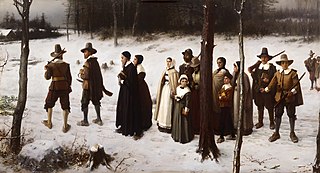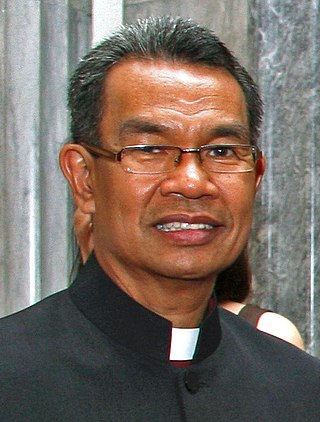Related Research Articles

Evangelicalism, also called evangelical Christianity or evangelical Protestantism, is a worldwide interdenominational movement within Protestant Christianity that affirms the centrality of being "born again", in which an individual experiences personal conversion; the authority of the Bible as God's revelation to humanity ; and spreading the Christian message. The word evangelical comes from the Greek (euangelion) word for "good news".

The World Evangelical Alliance (WEA) is an interdenominational organization of evangelical Christian churches, serving more than 600 million evangelicals, founded in 1846 in London, England, United Kingdom to unite evangelicals worldwide. WEA is the largest international organization of evangelical churches. The headquarters are in Deerfield, Illinois, with UN offices in New York City, Geneva, and Bonn. It brings together 9 regional and 143 national evangelical alliances of churches, and over one hundred member organizations. Moreover, the WEA includes a certain percentage of individual evangelical Christian churches. As of March 2021, the Secretary General of the WEA is German theologian Thomas Schirrmacher.

Religion in the Philippines is marked by a majority of people being adherents of the Christian faith. At least 88% of the population is Christian; about 79% belong to the Catholic Church while about 9% belong to Protestantism, Orthodoxy, Restorationist and Independent Catholicism and other denominations such as Iglesia Filipina Independiente, Iglesia ni Cristo, Jehovah's Witnesses, Seventh-day Adventist Church, Apostolic Catholic Church, United Church of Christ in the Philippines, Members Church of God International (MCGI) and Pentecostals. Officially, the Philippines is a secular nation, with the Constitution guaranteeing separation of church and state, and requiring the government to respect all religious beliefs equally.

The Convention of Philippine Baptist Churches is a Baptist Christian denomination churches union, affiliated with the Baptist World Alliance, in Philippines. Headquartered in Jaro, Iloilo City, Philippines, it was founded in 1900 as the first and oldest organized Baptist churches union in the Philippines when the country was opened to Protestant American missions after the succession of the Philippine islands by Spain to the United States in 1898.

A united church, also called a uniting church, is a church formed from the merger or other form of church union of two or more different Protestant Christian denominations.

Ternate, officially the Municipality of Ternate, is a 4th class municipality in the province of Cavite, Philippines. According to the 2020 census, it has a population of 24,653 people.

San Luis, officially the Municipality of San Luis, is a 3rd class municipality in the province of Pampanga, Philippines. According to the 2020 census, it had a population of 58,551 people.

Protestant denominations arrived in the Philippines in 1898, after the United States took control of the Philippines from Spain, first with United States Army chaplains and then within months civilian missionaries.

Christianity is the predominant religion in Uganda. According to the 2014 census, over 84 percent of the population was Christian, while about 14 percent of the population adhered to Islam, making it the largest minority religion. Anglicanism and Catholicism are the main Christian denominations in the country.

Christianity came to North Africa in the Roman era. According to historian Theodor Mommsen what is now Mediterranean Algeria was fully Christian by the fifth century. A notable Berber Christian of Algeria was Saint Augustine, important saints in Christianity. Christianity's influence declined during the chaotic period of the Vandal invasions but was strengthened in the succeeding Byzantine period. After the Arab invasions of the 7th century, Christianity began to gradually disappear.

Christianity is the most prevalent religion in the United States. Estimates from 2021 suggest that of the entire US population about 63% is Christian. The majority of Christian Americans are Protestant Christians, though there are also significant numbers of American Roman Catholics and other minority Christian denominations such as Latter-day Saints, Orthodox Christians and Jehovah's Witnesses. The United States has the largest Christian population in the world and, more specifically, the largest Protestant population in the world, with nearly 210 million Christians and, as of 2021, over 140 million people affiliated with Protestant churches, although other countries have higher percentages of Christians among their populations. The Public Religion Research Institute's "2020 Census of American Religion", carried out between 2014 and 2020, showed that 70% of Americans identified as Christian during this seven-year interval. In a 2020 survey by the Pew Research Center, 65% of adults in the United States identified themselves as Christians. They were 75% in 2015 70.6% in 2014, 78% in 2012, 81.6% in 2001, and 85% in 1990. About 62% of those polled claim to be members of a church congregation. "In God We Trust" is the modern official motto of the United States, as established in a 1956 law signed by President Dwight D. Eisenhower. The phrase first appeared on U.S. coins in 1864.

Christians in Nigeria comprise an estimated 49.3% of the population. Christians are dominant in the southern (south-east/south-south/South west and central region in Nigeria. According to the Pew Research Center, Nigeria has the largest Christian population of any country in Africa, with more than 80 million persons in Nigeria belonging to the church with various denominations. The majority of Christians in Nigeria are Protestant.

The National Council of Churches in the Philippines is a fellowship of ten Protestant and non Roman Catholic Churches in the Philippines denominations, and ten service-oriented organizations in the Philippines. A member of the World Council of Churches and the Christian Conference of Asia, the NCCP represents close to twelve million Protestant adherents. Advocacy for environmental protection and against large-scale mining are part of its core mission. Christian organizations other than churches may be received as associate members.

The United Church of Christ in the Philippines is a Christian denomination in the Philippines. Established in its present form in Malate, Manila, it resulted from the merger of the Evangelical Church of the Philippines, the Philippine Methodist Church, the Disciples of Christ, the United Evangelical Church and several independent congregations.

Protestantism is the largest grouping of Christians in the United States, with its combined denominations collectively comprising about 43% of the country's population in 2019. Other estimates suggest that 48.5% of the U.S. population is Protestant. Simultaneously, this corresponds to around 20% of the world's total Protestant population. The U.S. contains the largest Protestant population of any country in the world. Baptists comprise about one-third of American Protestants. The Southern Baptist Convention is the largest single Protestant denomination in the U.S., comprising one-tenth of American Protestants. Twelve of the original Thirteen Colonies were Protestant, with only Maryland having a sizable Catholic population due to Lord Baltimore's religious tolerance.

Efraim Tendero, born in the Philippines, is an Evangelical leader, an ambassador of the World Evangelical Alliance, former Secretary-General of World Evangelical Alliance. Prior to this position, he was National Director of the Philippine Council of Evangelical Churches for 22 years. He was also executive director of the Philippine Relief and Development Services (PHILRADS) and executive editor of the periodical "Evangelicals Today".
Evangelicalism is of the minor Christian denominations in the Philippines and is the fourth most widespread, followed closely by Iglesia ni Cristo and Hinduism.
References
- ↑ Kenneth Ross, Christianity in East and Southeast Asia, Edinburgh University Press, Scotland, 2020, p. 323
- ↑ STATE OF THE PHILIPPINE EVANGELICAL CHURCH TODAY: A POSITIVE RESPONSE
- ↑ "Philippine Population Surpassed the 100 Million Mark (Results from the 2015 Census of Population) | Philippine Statistics Authority". psa.gov.ph. Philippine Statistics Authority. Retrieved 11 October 2018.
- ↑ Philippine Council of Evangelical Churches, Members, pcec.org.ph, Philippine, retrieved December 5, 2020
- ↑ World Evangelical Alliance, REGIONAL & NATIONAL ALLIANCES, worldevangelicals.org, USA, retrieved December 5, 2020